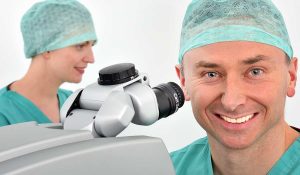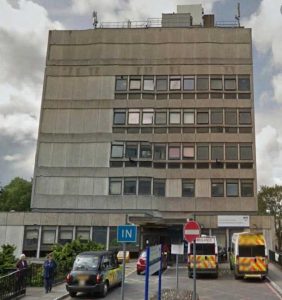Edinburgh consultant eye surgeon Jonathan Ross offers his view on why optometrists are central to the future of Edinburgh’s ophthalmic healthcare community.
The news that Edinburgh’s NHS Eye Pavilion may soon be closing has sent shockwaves through the medical community in Scotland, and through the thousands of grateful patients who have been treated there over the decades. Opened in 1969, the Edinburgh Eye Pavilion has provided tens of thousands of patients with world class eye care, though in recent years the building has outlived its expected lifespan and fallen into disrepair. With government plans to build a new eye hospital at Little France now stalled, Edinburgh may see much of its future eye care moved out of the city centre and devolved to a local community level.
Mr Hector Chawla, one of Edinburgh’s best known and most popular doctors, and former Edinburgh Eye Pavilion Director told the Evening News “It is to be dismantled. The plan to build a replacement beside the new Royal Infirmary has been revised by the SNP government, not because of an inspired new concept but apparently because there is a lack of available funding.”
The new proposal to replace the iconic 1970’s styled Eye Pavilion is to spread ophthalmic care services across the Lothians. The proposed scheme would transfer ophthalmic surgery to West Lothian, transporting large numbers of the sight impaired elderly patients along the M8 and back again.
Mr Ross said of the move “There are benefits in dispersing care across a larger geographical area. As with all healthcare provision, it is important that it can be accessed by people in their local communities, both urban and rural. Patients who visit us are often frail and many are no longer able to drive so public transport is crucial. Our patients are often very anxious about treatment, and many struggle to sleep the night before their appointment for fear of getting lost on the way and being delayed. So local care can be very desirable.”
However, Mr Chawla has voiced further concerns: “Ophthalmic provision needs an army of specialist ancillary staff who are very difficult to find, and as such units tend to be separate and centralised because ophthalmology is that unique branch of medicine comprehensible only to those who work in it. An Eye Pavilion theatre nurse could switch to general surgery but a nurse coming in the other direction could not.”
“I understand his concerns.” said Mr Ross. “Mr Chawla is quite rightly putting quality and patient safety before all else. The ophthalmic profession is highly specialised, ophthalmic surgeons are supported by talented, exceptional ophthalmic nurses, optometrists, anaesthetists and health care assistants. It’s a daunting task to bring all of these specialists together and the Edinburgh Eye Pavilion has always excelled at this.”
Eye Pavilion patients tend to be the elderly, often with limited ability to drive due to the nature of their problems. Many conditions such as cataracts remove the ability to negotiate your environment easily and by the time the patient attends their local eye centre, they are often below driving standard or legally blind. Whilst conditions such as cataracts are usually reversible, they do rely on expert care coming together seamlessly to provide sight saving surgery.
Mr Ross continued “If the Edinburgh Eye Pavilion was to close I think we would become even more reliant on community optometrists. The concern is that they already have a heavy workload. Most have worked all the way through lockdown, many in voluntary covid support roles as well as their day jobs and now that the we’re all out and about again their skills are required more than ever. Edinburgh is blessed with an exceptionally talented optometrist (optician) community who do an excellent job of providing high quality eye care in the region and because they see their patients once or twice every year, they tend to know their eye health better than anyone.
“Optometrists aren’t doctors but they are highly qualified. The have undergone 4 or 5 years of undergraduate training and often have years of post-graduate work and ‘on the job’ experience under their belts. They can examine eyes by looking at the eyes external structure but are highly trained in the use of complex equipment to examine the internal structures of the eye. They write prescriptions and treat common eye conditions. They are also often the first line of defence for more serious conditions that require an emergency referral to hospital.”
“The number of times an optometrist has picked up on some small change or anomaly in the eye is incredible” said Mr Ross. “I’m often astounded when a patient presents with what may seem a very minor complaint but turns out to be something more serious. This is the value of the profession of optometrists. In a city where there is no centralised specialist unit, optometrists would play a larger role in early detection of disease, so we can intervene before a situation becomes sight threatening.”
“In return, we as ophthalmologists would have a greater role to play in aiding the continual development of the optometry profession, ensuring they are adequately supported to stretch their members in new and challenging ways.”
To read the full article by Former Director, Hector Chawla, https://www.edinburghnews.scotsman.com/health/edinburghs-eye-pavilion-former-director-hector-chawla-spells-out-why-scottish-government-plans-are-an-act-of-vandalism-3141059


